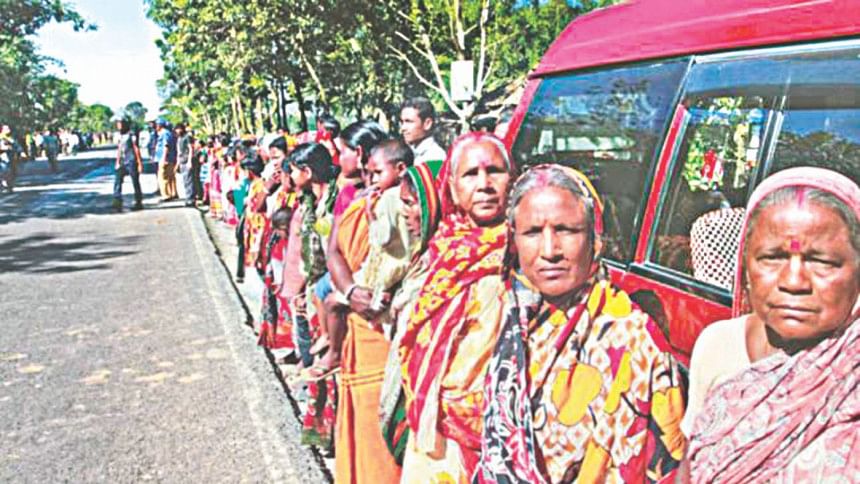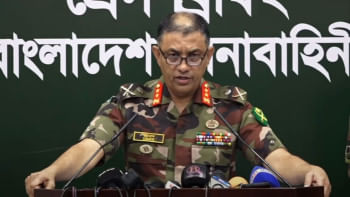A sense of fear prevails

December 10, 2017 marked the 70th anniversary of the adoption of the UN Universal Declaration of Human Rights (UDHR). The historic document laid down the principle that people all over the world, irrespective of their diverse backgrounds, have fundamental human rights that must be protected. This is a day to show solidarity to those who struggle for their rights. The year 2017 also marks the 50th anniversary of two major documents on human rights: the International Covenant on Economic, Social and Cultural Rights (ICESCR) and the International Covenant on Civil and Political Rights (ICCPR), which were produced by the UN Human Rights Commission.
After 70 years of UDHR and 50 years of ICESCR and ICCPR, what is the human rights situation in Bangladesh in 2017?
There have been continued attacks on free-thinkers and civil society members for expressing their views. Such acts threaten people's constitutional right to freedom of speech. On December 5, Ain o Salish Kendra (ASK) organised a civil society dialogue with the National Human Rights Commission, Bangladesh (NHRC,B) in which 20 rights workers from 14 districts and others working with various national human rights organisations were present. They all acknowledged that they are working with a sense of fear and insecurity.
In the last few years, this sense of fear and insecurity has intensified leading to a culture of self-censorship. It's like a double-edged sword; on one side, there are threats of attacks from the extremists and powerful sections of the society, and on another, there is the fear of offending the state and its agencies.
The use of Section 57 of the ICT Act has been considered a disenabling factor to the human rights activists, journalists and free-thinkers in expressing their opinion. This trend is shrinking the space for creativity, open discussion, debate and thus development of an independent, secular and democratic nation. The government has argued that the new draft Digital Security Act would put to rest all controversies surrounding Section 57. In reality, what happened is that Section 57 has been embedded into sections 19 and 20 of the proposed Digital Security Act. Thus, all arguments against Section 57 will stand true against the new law. It will also criminalise unwanted online writing through vague terms and shrink space for intellectual discourse by promoting self-censorship.
In 2017, the alarming trend of enforced disappearance continues, despite concerns expressed repeatedly by national and international human rights organisations. According to an estimate by ASK, 54 persons were allegedly victims of enforced disappearance since January 2017, and some 366 persons between 2013 and 2017. This number itself is mind-boggling and justifies the general sense of fear among the people. Utpal Das, a journalist of an online news portal, remains missing since October 10, 2017. On November 7, Dr Mubashar Hasan, an assistant professor of a private university, disappeared. Their whereabouts could not be traced till date.
The government and law enforcement agencies have consistently denied any involvement in the disappearance cases. Although a few victims were later produced in court by the security forces, or surfaced alive, most of them remain unaccounted for. Sometimes the dead bodies of the victims have been found with visible wounds. The victims who came back barely talk to the media and disclose any information regarding their detention. In many cases, the police have refused to accept general diaries if the complaint contains an allegation that a law enforcement agency was involved. In rare cases where the families were finally able to file complaints, there has been little or no progress in investigation.
The term "enforced disappearance" is absent in national laws although civil society organisations and human rights activists have repeatedly demanded its official recognition. Thus, this dreadful act is dealt under the definition of "abduction," rejecting the involvement of state agencies. In any case, it is the duty of the state to find out whoever is responsible behind a case of disappearance and provide safeguards to its citizens to ensure their right to life. Such incidents are a gross violation of human rights and an international crime. To end this culture of impunity, ASK has repeatedly demanded response from the state to bring an end to this heinous crime acknowledging the incidents of enforced disappearance. ASK also urges the government to establish an independent commission to ensure transparent and accountable investigation of all alleged enforced disappearances, and prosecution and punishment of those responsible, and reparations for the victims to establish justice in society.
Attacks on the religious minorities and indigenous people also continued this year. In Thakurpara, Rangpur, religious extremists burned down at least 30 Hindu houses because a Hindu had allegedly posted objectionable content related to Islam on Facebook. The role of local law enforcement agencies was questionable, as they failed to play a proactive role and take preventive measures although a group of people were inciting the locals to violence for days. There were all signs of an impending attack.
A democratic society must offer opportunities for peaceful movement. On July 20, students of seven Dhaka University-affiliated colleges were demanding on the streets for information on their exam schedules. At one point during the protest, a student's eyes were exposed to a teargas shell hurled by a member of the security agencies and eventually he lost his eyesight.
In short, the human rights situation in Bangladesh paints a picture in stark contrast to that envisioned by our Constitution. There is a constitutional guarantee of fundamental human rights for all in Bangladesh. Article 32 of the Constitution proclaims that "no person shall be deprived of life or personal liberty save in accordance with law." Despite that, Bangladesh has witnessed a large number of extrajudicial killings and enforced disappearances each year. We should not forget that the people, society and country will prosper only when the rights of the people are ensured and protected.
Sheepa Hafiza is an equality and rights activist, and executive director of Ain o Salish Kendra (ASK).










Comments